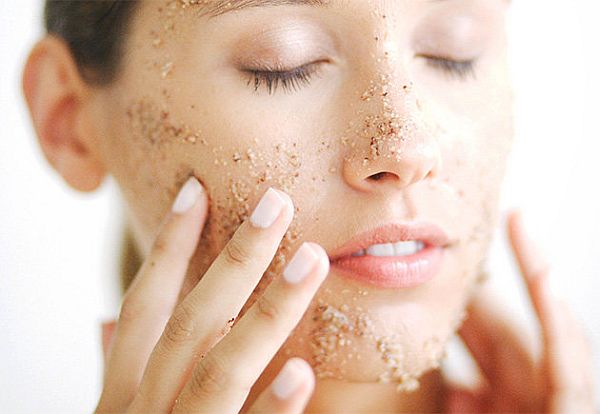You might want clear skin more than anything, but achieving it can seem elusive. There are products and treatments in the hundreds, and advice comes from every direction—much of it based on myths and misconceptions. Knowing what genuinely works for acne could be the main difference in skin care and overall skin health. We will now dispel some of the myths regarding acne and go through ideal strategies that bring about acne-free skin.
Clear Skin Goals
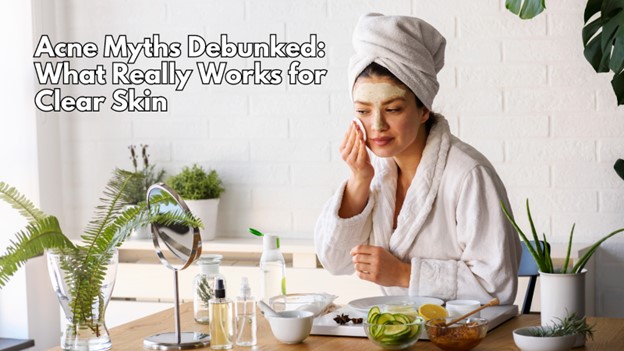
If any myth about acne can outlast others, then probably it is that a single solution or some magic all-in-one elixir does exist. Although many products claim to be a definitive solution in this regard, the fact is that clear skin goals are highly individualistic and depend on a number of factors, considerably including skin type, lifestyle, diet, and genetics. However, well-formulated acne solutions can be incredibly effective when chosen and used correctly, especially those containing proven ingredients like benzoyl peroxide, salicylic acid, or retinoids.
The ultimate goal is to find an acne clear formula that will work with you and address individual skin needs. A well-formulated product with the right mix of ingredients can help control acne symptoms without causing irritation. It is also important to incorporate these products into a comprehensive routine that includes gentle cleansing, moisturizing, and sun protection.
Busting Common Acne Myths
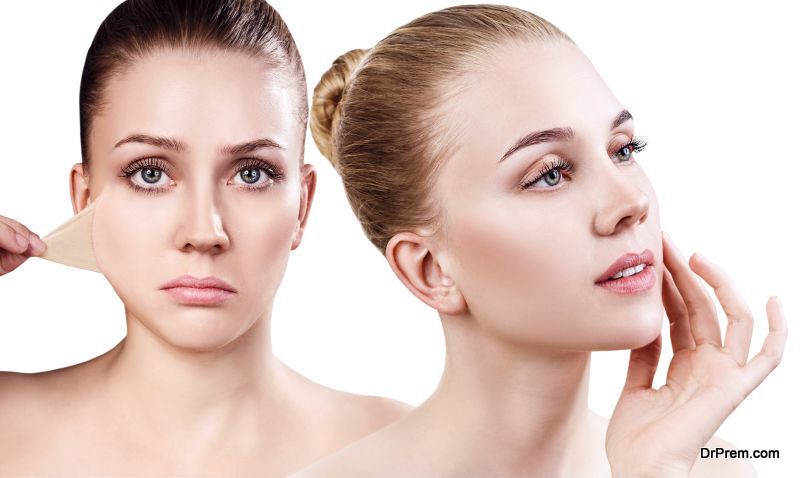
Here are the most common acne myths that people always adopt in their skincare routines. Knowing the realities behind these beliefs might help you improve your skincare regimen and achieve your clear skin goals.
Myth 1: Acne Caused Due to Poor Hygiene
Perhaps one of the biggest myths is that acne results from being unhygienically clean. While it is important to keep the skin clean, acne doesn’t actually result from it. In fact, washing your face too often is very damaging and might strip your skin of its natural oils, leading to dryness and increasing oil production, which worsens your acne.
Acne results from the interaction of several factors, which include the production of excess oil, blockage of the pores, bacteria, and inflammation. It might also be attributed to changes in hormones, diet, and significant stress. Gentle, non-comedogenic cleansers should be used to clean the skin and avoid over-exfoliating. This ensures better care for acne-prone skin.
Myth 2: Eating Chocolate and Greasy Foods Causes Acne

A wider misconception purports that chocolate and greasy foods are another major factor for acne. While diet does make a difference in influencing one’s skin health, these foods do not cause acne. Some studies infer certain people have increased risks with foods that have a high glycemic index and with milk, but this differs among people.
A diet high in fruits, vegetables, whole grains, and lean proteins will help overall health as well as maintain clearer skin. Drinking an adequate amount of water and not consuming excessive amounts of sugar and processed foods will also keep your skin clear.
Myth 3: Going into the Sun Will Clear Up Acne
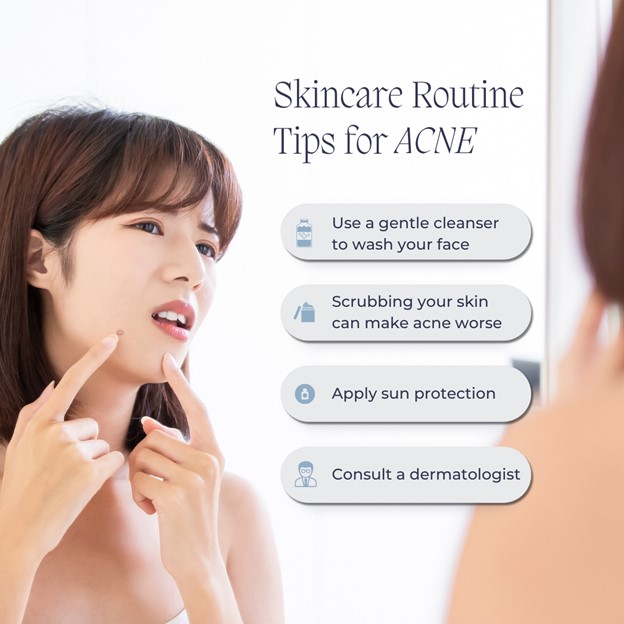
Acne can be dried from the sunlight, as some people think, but further indulgence is like making the condition worse. Much as a tan will do, yes, it can mask the acne, but sun exposure actually worsens the condition. UV rays increase inflammation and PIH, which is post-inflammatory hyperpigmentation, making acne scars more visible.
Furthermore, unprotected overexposure to the sun drastically raises the chances of skin cancer and enhances skin aging. Use a non-comedogenic sunscreen daily, regardless of your skin type.
What Works for Clear Skin
Clear skin is achieved through an integrated approach that combines good skincare, a healthful lifestyle, and medical treatments and/or procedures when needed. Here are some surefire tips that may help get you started in the right direction for clearer skin:
Develop a Consistent Skincare Routine
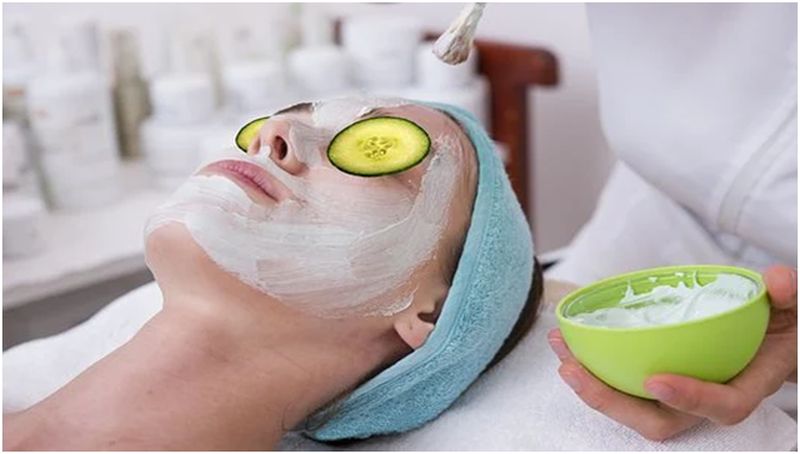
Controlling acne requires a proper and regular skincare routine, attuned to your skin type and concerns. Start by cleansing your face using a mild cleanser that will not strip but will remove excess oil and impurities from the skin’s surface. This can be followed by a treatment product with actives like salicylic acid, benzoyl peroxide, or retinoids to fight acne-causing bacteria, unclog pores, or encourage cell turnover.
Moisturizing is also a requirement for skin, no matter how oily or acne-prone it is. Just use a non-comedogenic moisturizer that is designed for hydration but doesn’t clog pores. Lastly, don’t forget to apply sunscreen by day, so your skin is protected from UV damage.
Never Pick or Squeeze Pimples
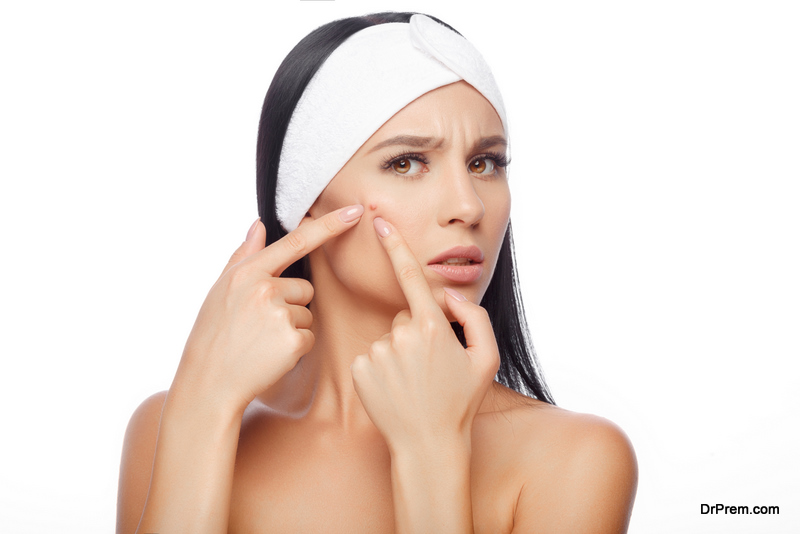
Absolutely resist picking or squeezing the pimples, as this further leads to inflammation, scarring, and possibly infection. Give the acne treatments some time to work and let the blemishes heal on their own. Visit a dermatologist in case your acne conditions turn out to be chronic or severe; in such cases, you will be provided with extractions, chemical peels, and laser therapy.
Consider Professional Treatments
The acne problem is so great, at times, that over-the-counter products are not sufficient to control it. Professional treatments will naturally yield much better results and could be in the form of prescription medications, chemical peels, or laser therapy. Prescription treatments include topical or oral antibiotics, retinoids, or hormonal therapies; each choice depends on the severity and type of acne.
They may also suggest the proper interventions for your condition and your skin type. Regular check-ups from a skincare professional will assist you in keeping on the right track to your skincare goals and will help in surging or changing treatments when necessary.
Manage Stress and Maintain a Healthy Lifestyle

Stress could trigger acne flare-ups through the secretion and inflammation that result in oil overproduction. Stress management using methods like meditation or exercise, in combination with other interventions to induce relaxation, backed up by good sleep, may help to keep acne flare-ups in check.
A healthy lifestyle combined with a well-balanced diet, regular activity, and enough water contributes to skin health. Avoiding dangerous addictions, like smoking and excessive drinking, will also help improve the condition of skin problems.
Use Non-Comedogenic Products
If you have acne-prone skin, look for products that are labeled as non-comedogenic, which essentially means ‘formulated not to clog pores.’ This is especially important if you’re prone to acne because the blocking of pores by some products will undeniably lead to more breakouts.
Mostly non-comedogenic products can be identified as moisturizers sunscreens, and makeup that lacks heavy oils, among other pore-clogging ingredients. It is through the use of such products that a clear complexion can be guaranteed without having your acne worsened.
FAQs
Can acne be completely cured?
While there is no absolute cure for acne, it can be effectively managed with a proper skincare routine and appropriate treatments. Most people eventually achieve clear skin with consistent care and by addressing the underlying causes or triggers of acne, whether hormonal or dietary.
How long does acne treatment take to work?
The duration to initiate results in acne treatment depends on the severity of the acne and the type of treatment chosen. Normally, several weeks to a few months are given for observing significant improvement. One has to be patient and consistent to have clear skin and maintain it.
Are home remedies useful in treating acne?
Some of the natural remedies such as tea tree oil, green tea extract, and aloe vera assist in minimizing symptoms of acne due to the content of anti-inflammatory and antibacterial ingredients. However, they are less strong compared to prescription treatment drugs and may not work for all. However, it is advisable to consult a dermatologist before introducing new treatments, especially for sensitive skin or severe acne.
Conclusion
Aiming for clear skin literally means knowing and addressing the sources of acne rather than resorting to myths or magic treatments. By debunking some of the misconceptions and revealing some of the tricks, you can take back your skin’s health with confidence and start your clear-complexion journey the right way.
A regular skin-care regimen, healthy lifestyle choices, and professional help, if needed, make a real difference in taming acne and achieving clear skin goals. Remember, all of us have different types of skin and everybody needs to find the perfect combination of treatments and products for success in the long run.
Article by Community Writer.


